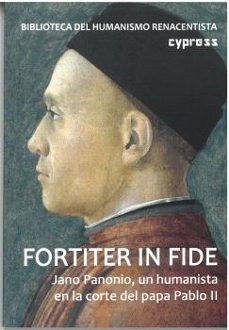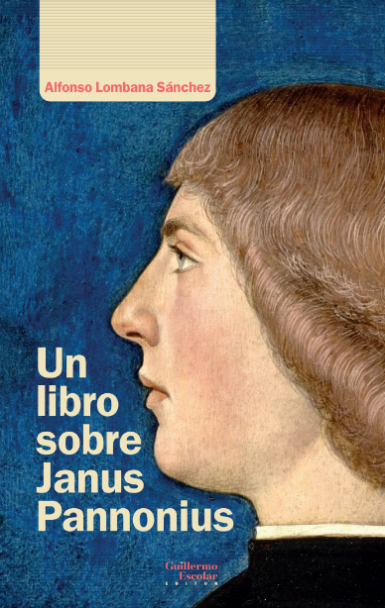Publications
- Fortiter in Fide. Jano Panonio. Un humanista en la corte del papa Pablo II, Sevilla, Cypress Cultura, 2023.
- Un libro sobre Janus Pannonius, Madrid, Guillermo Escolar, 2023.
- «On the Spirituality of Janus Pannonius», Revista Española de Teología 83. 1, 2023, 79-92.
- «Sincerus nullos affectus computat annos. Analysis of Janus Pannonius' Elegy 24 with special attention to the version preserved in the ms. Seville, Biblioteca Capitular y Colombina, 7-1-15», Studia Philologica Valentina 25, 2023, 169-184.
- «¿A quién dedicó Janus Pannonius su Ep. 413?», Euphrosyne 51, 2023.
- «La mujer en la obra de Jano Panonio», in Anuario de la SELGYLC (2024).
- «The Janus Legacy in Seville», in Hungarian Studies - Special Issue on Early Modern Hungary (2024).
- «Dietrich von Pleningen's contribution to the manuscript legacy of Janus Pannonius: the ms. Stuttgart, Württembergische Landesbibliothek, Cod. poet. et phil. qt. 21», Humanistica Lovaniensia. Journal of Neo-Latin Studies 72. 2, 2024.
- «Janus Readers», Blog-Post in humanistas.eu.
- «Renaissance values and spirituality in the Guarino school of Verona», Specula 8.2, 2024.
- «Tradition, analysis and ecocritical analysis of the El. 31 by Janus Pannonius», in Actas del XVI Congreso de la SEEC, 2024.
Edition for the first time of the historical speeches that Janus Pannonius gave in Rome in 1465.  Book
Book
Biographical study of Janus Pannonius, with special emphasis on his literary production, his transmission and the cultural impact of his appearance in Quattrocento Europe.  Book
Book
The Hungarian humanist Janus Pannonius (1434-1472) served as John III, Bishop of Pécs (Hungary) between 1459 and 1472. Nevertheless, in the important legacy that he left behind as a writer, we find very little texts that make direct reference to his spirituality. In fact, for various reasons-among them, the abundant presence of classical mythology in his work-there has been an inclination to view Janus Pannonius as an author far removed from the Christian faith. In addition to examining and questioning this hypothesis, this article aims to better understand the spirituality of this influential writer and bishop, above all by analyzing his Elegy n. 30, sometimes entitled Ad animam suam
Despite his short life, Janus Pannonius (1434-1472), the Hungarian humanist, was one of the most enduring Neo-Latin poets in Central Europe. In his literary legacy we find works of poetic excellence such as Elegy 24, the threnos for the death of his deceased mother (Elegy 24). The present article aims both to analyse the very fruitful use of classical motives in the elegy and to emphasise the relevance of the version of the poem preserved in the ms. Sevilla, Biblioteca Capitular y Colombina, 7-1-15, provided with very personal comments.
Link
This paper aims to contextualize Janus Pannonius' epigram 413 in the last stage of his life. These verses have been supposed to be dedicated to his uncle, Bishop Janos Vitéz of Esztergom. However, regarding the environment surrounding Janus and the history of the manuscript legacy, these ambivalent verses must be rethought again: what if he wrote them himself?
This study examines various female archetypes depicted in the erotic epigrams of Janus Pannonius (1434-1472), a Hungarian Neo-Latin poet. It analyzes the diverse portrayals of women and their classical models.
The rich handwritten and printed tradition of Janus Pannonius is more difficult to explain after the discovery of the Janus Collections in Seville, Biblioteca Capitular y Colombina, ms. 7-1-15 and 56-4-57. The initial euphoria led the researchers to assume that the codices of Seville were directly connected with Janus Pannonius. However, later judgments forced a reconsideration of this opinion and recommended caution in affirming these connections. The aim of this paper is to collect the latest discoveries surrounding these manuscripts and shed some light on the legacy of Janus Pannonius preserved in Seville.
Dietrich von Pleningen's contribution to cultivating and disseminating humanistic culture in Germany was manifold; in addition to translating the work of ancient authors, which have already been analyzed, he was also very active in copying several works of other, often contemporary authors. The following paper aims to examine the parts copied in Italy from a codex started in 1477 and preserved nowadays in Stuttgart, Württembergische Landesbibliothek, Cod. poet. et phil. qt. 21. This codex included important texts from humanist Janus Pannonius (Panegyricus in Guarinum and the Elegies 16 and 17) as well as works by Tito Vespasiano Strozzi, among others.
This article discusses the impact Janus Pannonius had on the many who admired and read him. All of these "Janus Readers" have maintained their interest in his work to the present day.
Link
The article examines humanism in the 15th century, with a particular focus on the presence of Christian values. The study focuses on Guarino da Verona's school in Ferrara, a pivotal institution that educated numerous humanists. The analysis explores Guarino's pedagogical vision, his educational priorities and, in particular, the impact of his teachings among three outstanding students: Battista Guarino, Ludovico Carbone and Janus Pannonius. Taking the latter as an example, Elegy 30 is examined in light of Pannonius' reflections on the soul. The article concludes that Guarino da Verona's school played a central role in promoting Renaissance values that require further understanding.
This article aims to analyze Elegy 31 of Janus Pannonius "On the Flood" with two essential objectives: firstly, to scrutinize the manuscript legacy with particular attention to the sources preserved in Spain and, secondly, to interpret the verses from an ecocritical perspective.





